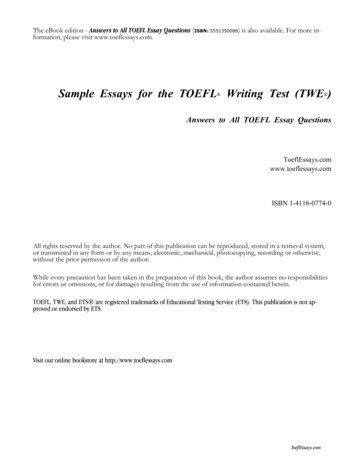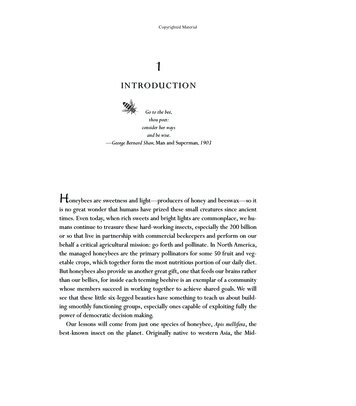
Transcription
Shaw 006609/15/2005 04:31 PMTHE ONLINE LIBRARY OF LIBERTY Liberty Fund, Inc. GE BERNARD SHAW, FABIAN ESSAYS IN SOCIALISM (1889)URL of this E-Book: http://oll.libertyfund.org/EBooks/Shaw 0066.pdfURL of original HTML file: http://oll.libertyfund.org/Home3/HTML.php?recordID 0066ABOUT THE AUTHORThe playwright George Bernard Shaw, alongwith the writers and educators Sidney andBeatrice Webb, the feminist EmmelinePankhurst, and the novelist H. G. Wells, wasone of the earliest members of the FabianSociety, which was founded in England in In1884. Its aim was to bring about a socialistsociety by means of intellectual debate, thepublication of books and pamphlets, and the"permeation" of socialist ideas into theuniversities, the press, governmentinstitutions, and political parties.ABOUT THE BOOKThis collection of essays by the so-called"Fabian Socialists" (who advocated socialismby means of gradual political and economicreform instead of by revolution as preferred bythe Marxists) prompted a vigorous defense oflaissez-faire economic policies by leadingEnglish classical liberals in the early 1890s.Two volumes of these rebuttals of Fabiansocialism were edited by Thomas Mackay. The3 volumes together make interesting reading.THE EDITION USEDFabian Essays in Socialism, ed. G. BernardShaw, American Edition Ed. by H.G. Wilshire,(New York: The Homboldt Publishing Co.,1891).COPYRIGHT php?recordID 0066Page 1 of 187
Shaw 006609/15/2005 04:31 PMThe text of this edition is in the public domain.FAIR USE STATEMENTThis material is put online to further theeducational goals of Liberty Fund, Inc. Unlessotherwise stated in the Copyright Informationsection above, this material may be usedfreely for educational and academic purposes.It may not be used in any way for profit.TABLE OF CONTENTSTHE BASIS OF SOCIALISM.HISTORIC. BY SYDNEY WEBB, LL.B., BARRISTER AT L AW , L ECTURER ON POLITICAL E CONONY AT THEC ITY OF L ONDON C OLLEGE .T HE D EVELOPMENT OF THE D EMOCRATIC I DEAL . ANCESTRY OF ENGLISH SOCIALISM.—THEUTOPIANS.—INTRODUCTION OF THE CONCEPTION OF EVOLUTION.—THE LESSON OFDEMOCRACY,T HE D ISINTEGRATION OF THE O LD SYNTHESIS. THE DECAY OF MEDIEVALISM.—THEINDUSTRIAL REVOLUTION.—THE FRENCH REVOLUTION.—THE PROGRESS OFDEMOCRACY,T HE PERIOD OF ANARCHY . INDIVIDUALISM.—PHILOSOPHIC RADICALISM AND LAISSEZFAIRE.—THE UTILITARIAN ANALYSIST HE I NTELLECTUAL AND MORAL R EVOLT; AND ITS POLITICAL O UTCOME . THE POETS,COMMUNISTS, PHILOSOPHERS, CHRISTIAN SOCIALISTS, AND EVOLUTIONISTS.—THEEXTENSION OF STATE ACTIVITY.—EXISTING STATE REGISTRATION, INSPECTION,AND DIRECT ORGANIZATION OF LABOR.—THE RADICAL PROGRAM,T HE NEW SYNTHESIS. EVOLUTION AND THE SOCIAL ORGANISM.—LIBERTY ANDEQUALITY.—SOCIAL HEALTH,INDUSTRIAL. BY WILLIAM CLARKE, M.A., C AMBRIDGE.T HE SUPERSESSION OF I NDIVIDUALIST PRODUCTION.THE COTTAGE INDUSTRY,—THEMECHANICAL INVENTIONS.—THE FACTORY SYSTEM,T HE G ROWTH OF THE G REAT I NDUSTRY . THE EXPANSION OF LANCASHIRE.—THE WHITESLAVERY.—STATE INTERFERENCE,T HE D EVELOPMENT OF THE WORLD-C OMMERCE . THE TRIUMPH OF FREE TRADE.—THEFIGHT FOR NEW MARKETS.—THE CARRIERS OF THE WORLD,T HE D IFFERENTIATION OF MANAGER AND C APITALIST . THE RISE OF COÖPERATION ANDTHE JOINT STOCK COMPANY.—THE "RING" AND THE "TRUST".—THE DESPOTISM OFCAPITAL hp?recordID 0066Page 2 of 187
Shaw 006609/15/2005 04:31 PMCAPITAL COMMUNISM,MORAL. BY SYDNEY OLIVIER, B.A., O XFORD.T HE E VOLUTION OF MORALITY . THE COMMON END.—THE CONDITIONS OF FREEDOM.—THE INDIVIDUAL AND THE RACE.—THE GROWTH OF SOCIAL CONSCIOUSNESS.—CONVENTION AND LAW,PROPERTY AND MORALS . THE REACTION OF PROPERTY-FORMS ON MORAL IDEAS.—CLASS MORALITY.—NEGATION OF THE CONDITIONS OF FREEDOM.—SOCIALDISSOLUTION,T HE R EINTEGRATION OF SOCIETY . THE ORDERING OF THE PRIMARY CONDITIONS.—THEIDEA OF THE POOR LAW.—SECONDARY CONDITIONS.—MORALITY AND REASON.—THE IDEA OF THE SCHOOL,ECONOMIC. BY G. BERNARD SHAW.R ENT. THE CULTIVATION AND POPULATION OF THE EARTH.—ECONOMIC ORIGIN OFTHE COUNTY FAMILY.—ECONOMIC RENT OF LAND AND ABILITY.—TENANT RIGHT.—THE ADVENT OF THE PROLETARIAN,VALUE. MECHANISM OF EXCHANGE.—PRICE AND UTILITY.—EFFECTS OF SUPPLY.—LAW OF INDIFFERENCE.—TOTAL AND FINAL UTILITY.—RELATION OF VALUE TO COSTOF PRODUCTION,WAGES . THE PROLETARIAT.—SALE OF LABOR. — SUBSISTENCE WAGE.—CAPITALISM.—INCREASE OF RICHES AND DECREASE OF WEALTH.—DIVORCE OF EXCHANGEVALUE FROM SOCIAL UTILITY,C ONCLUSION. APPARENT DISCREPANCIES BETWEEN HISTORY AND THEORY.—SOCIALISM.—PESSIMISM AND PRIVATE PROPERTY.—ECONOMIC SOUNDNESS OFMELIORISM,THE ORGANIZATION OF SOCIETY.PROPERTY UNDER SOCIALISM. BY GRAHAM WALLAS, M.A., O XFORD.VISIBLE WEALTH. CONSUMERS' CAPITAL.—PRODUCERS' CAPITAL,D EBTS AND SERVICES. DEFERRED AND ANTICIPATED CONSUMPTION.—INTEREST,I DEAS . COPYRIGHT AND PATENT RIGHT.—EDUCATION,INDUSTRY UNDER SOCIALISM. BY ANNIE BESANT.T HE O RGANIZATION OF L ABOR . RURAL.—URBAN.—INTERNATIONAL,T HE D ISTRIBUTION OF THE PRODUCT . THE INDIVIDUAL.—THE MUNICIPALITY.—THESTATE,SOCIAL SAFEGUARDS . THE STIMULUS TO LABOR.—THE PROVISION FOR INITIATIVE.—THE REWARD OF EXCELLENCE,THE TRANSITION TO SOCIAL DEMOCRACY.TRANSITION. BY G. BERNARD SHAW.MEDIEVALISM TO C APITALISM. THE OLD ORDER.—MERCHANT ADVENTURER, PIRATE,SLAVE-TRADER, CAPITALIST. — THE OLD ORDER BURST BY THE NEW Book.php?recordID 0066Page 3 of 187
Shaw 006609/15/2005 04:31 PMANARCHY TO STATE I NTERFERENCE . POLITICAL ECONOMY.—HEGELIAN CONCEPTION OFTHE PERFECT STATE.—SOCIALISM: ITS PRACTICAL DIFFICULTIES. —IMPRACTICABILITY OF CATASTROPHIC CHANGE.—DEMOCRACY THE ANTIDOTE TOBUREAUCRACY.—THE STATE INTERFERES,STATE I NTERFERENCE TO STATE O RGANIZATION. HARD TIMES. — REVIVAL OFREVOLUTIONARY SOCIALISM.—REMAINING STEPS TO THE CONSUMMATION OFDEMOCRACY.—MACHINERY OF SOCIALISM.—SOCIAL PRESSURE. — URBAN RENTS.—THE NEW TAXATION.—STATE ORGANIZATION OF LABOR ITS INDISPENSABLECOMPLEMENT. — THE UNEMPLOYED.—SOLUTION OF THE COMPENSATIONDIFFICULTY.—ECONOMIC REACTIONS OF THE PROGRESS OF MUNICIPAL SOCIALISM.—MILITANT SOCIALISM ABANDONED BUT NOT DISHONORED,THE OUTLOOK. BY HUBERT BLAND.T HE C ONDITION OF E NGLISH PARTIES . THE LINES OF PROGRESS.—THE RATE OFPROGRESS IN THOUGHT AND INDUSTRY COMPARED WITH THAT IN POLITICS.—ALLEGED DISAPPEARANCE OF THE WHIG,T HE SOCIALIZING OF POLITICS . POLITICAL MYOPIA.—SHAM SOCIALISM.—REDHERRINGS.—DREAMS OF PERMEATING THE LIBERAL PARTY.—DISILLUSIONMENT.—THE NEW DEPARTURE,T HE D UTIES OF THE HOUR . THE TRUE LINE OF CLEAVAGE.—HOPES AND FEARS.—THESOLIDARITY OF THE WORKERS,I NDEXGEORGE BERNARD SHAW, FABIAN ESSAYS IN SOCIALISM (1889)THE SOCIAL SCIENCE LIBRARYEDITED BY W. D. P. BLISS.F ABIAN ESSAYS IN S OCIALISM.C OPYRIGHT 1891,BYT HE HUMBOLDT PUBLISHING C dID 0066Page 4 of 187
Shaw 006609/15/2005 04:31 PMFABIAN ESSAYS IN SOCIALISMBYG. BERNARD SHAW, SIDNEY WEBB, WILLIAM CLARKE,SYDNEY OLIVIER, ANNIE BESANT, GRAHAMWALLAS AND HUBERT BLAND.EDITED BYG. BERNARD SHAW.AMERICAN EDITIONEDITED BYH. G. WILSHIRE."For the right moment you must wait, as Fabian did, most patiently, when warring againstHannibal, though many censured his delays, but when the time comes you must strike hard asFabian did, or your waiting will be in vain and fruitless."—Fabian Motto.NEW YORKTHE HUMBOLDT PUBLISHING CO.C LINTON HALL, ASTOR PLACE .PREFACETO THE AMERICAN EDITION.THE Fabian Society, which has already issued twenty-five thousand copies of this collection ofessays, is an association of Socialists, including in their ranks some of the ablest of England'seconomic writers, and having their headquarters in London, with affiliated independent branchesin most of the principal cities and large towns of Great Britain and Ireland.From the official statement of their principles, I quote as follows:"THE F ABIAN SOCIETY aims at the reorganization of Society by the emancipation of Land andindustrial Capital from individual and class ownership, and the vesting of them in thecommunity for the general benefit. In this way only can the natural and acquired advantages ofthe country be equitably shared by the whole people.The Society accordingly works for the extinction of private property in land and of theconsequent individual appropriation, in the form of Rent, of the price paid for permission to usethe earth, as well as for the advantages of superior soils and sites.The Society, further, works for the transfer to the community of the administration of suchindustrial Capital as can conveniently be managed socially. For, owing to the monopoly of rdID 0066Page 5 of 187
Shaw 006609/15/2005 04:31 PMindustrial Capital as can conveniently be managed socially. For, owing to the monopoly of themeans of production in the past, industrial inventions and the transformation of surplus incomeinto Capital have mainly enriched the proprietary class, the worker being now dependent onthat class for leave to earn a living.If these measures be carried out, without compensation (though not without such relief toexpropriated individuals as may seem fit to the community), Rent and Interest will be added tothe reward of labor, the idle class now living on the labor of others will necessarily disappear,and practical equality of opportunity will be maintained by the spontaneous action of economicforces with much less interference with personal liberty than the present system entails.For the attainment of these ends the Fabian Society looks to the spread of Socialist opinions,and the social and political changes consequent thereon. It seeks to promote these by thegeneral dissemination of knowledge as to the relation between the individual and Society in itseconomic, ethical, and political aspects.The work of the Fabian Society takes, at present, the following forms:—1 . Meetings for the discussion of questions connected with Socialism.2 . Meetings of a more public character, for the promulgation of Socialist opinions.3 . The further investigation of economic problems, and the collection of facts contributing to theirelucidation.4 . The publication of pamphlets containing information on social questions, or arguments relatingto Socialism.5 . The promotion of Socialist lectures and debates in other Societies.6 . The representation of the Society in public conferences and discussions on social questions.7 . The organization of conferences of Social reformers, with a view to common action.The purely political work of the Society is in the hands of its Political Committee.The members, divided into local groups, are pledged to take part according to their abilities andopportunities in the general work of the Society, especially as regards their own localities, andalthough there is no compulsory subscription, are expected to contribute annually to theSociety's funds. The amount of each member's subscription is known only to the ExecutiveCommittee.The Society seeks recruits from all ranks, believing hat not only those who suffer from thepresent system, but also many who are themselves enriched by it, recognize its evils and wouldwelcome a remedy.The Society meets on the first and third Fridays in the month, at 8 P. M. Further informationmay be obtained from the Secretary, E. R. PEASE, 276 Strand, W. C., London, England."To the American reader of these essays, it may prove a matter of surprise to learn that EnglishSocialists find in the United States the most pronounced economic phenomena, which, to theireyes at least, seem to prognosticate the near approach of the coming social revolution. I referto the p?recordID 0066Page 6 of 187
Shaw 006609/15/2005 04:31 PMto the "Trusts."It may be remarked, however, that while they consider the "Trust" as a symptom that thecompetitive system is in its last throes, they wait for the appearance of similar industrialcombinations in England to stir Englishmen to a revolt; and that Americans, as if to square theaccount of '76, are to learn revolution from their trans-Atlantic cousins.By "revolution" is to be understood, of course, not violence, but a complete change of system;and by "revolutionists," those who advocate such a complete change. As Lassalle reminded usyears ago, trifling reforms may be, and often have been, accompanied by excessive bloodshed,while revolutions have worked themselves out in the profoundest tranquillity.It seems to be typical of all social revolutionists that national pride always asserts itself, nomatter how much patriotism may be decried as mere racial selfishness whenever discussionarises as to which nation is to be the first to throw off the shackles of capitalism.The Fabian essayists certainly make out a strong case in England's favor.The German points with pride to the million and a half votes polled by the Socialists at the lastelections for the Reichstag.France, the mother of revolutions, sings the Marseillaise.The Belgian asks but for universal suffrage to show the world what he will do in the way ofrevolution.I, as an American Socialist, put forth my patriotic plea in favor of my own country's prospectsof being the first to inaugurate the era of industrial emancipation.There is one point upon which I think all Socialists are agreed, namely, that it is one and thesame golden chain that fetters the proletariat of all nations, and that the weakest link in thatchain is the measure of the strength of the present social system. Snap but one link in anycountry, and at the same moment the proletariat of the world are free.The social revolution, when it does come, must soon be international, (though resting perhapsfor a period upon national Socialism). I imagine, for instance, that on gaining universalsuffrage, Belgium's proletariat should expropriate the capitalists and inaugurate a successfulcoöperative commonwealth. Is it possible to conceive that workingmen of all nations would notmake a successful demand for the establishment of a like social system in their own respectivecountries? Moreover, the general industrial condition of the great nations is approximately thesame. All complain of overproduction. All are vainly trying to solve the question of theunemployed; in all the tendency to great social change is a marked feature. In all the greatcapitalists, crushing out their smaller rivals and concentrating wealth into fewer and fewerhands, are the true progenitors of the revolution.The proletariat of the United States, the nation that certainly furnishes the best educationalfacilities for demonstrating the advantages of the concentration and crystallization of ?recordID 0066Page 7 of 187
Shaw 006609/15/2005 04:31 PMfacilities for demonstrating the advantages of the concentration and crystallization of capital,should naturally and logically be the first to strike for economic freedom. To-day, in the UnitedStates, 50,000 people, out of a population of over sixty-three millions, own everything worthhaving in the whole country.Four men, viz.: Gould, Astor, Vanderbilt and Rockefeller, practically control, and, what is moreimportant, are rapidly absorbing the wealth of this 50,000. The day is not so very far distant,and a sociologist can predict almost its exact appearance, just as an astronomer calculates thedate of an eclipse of the sun, when, if no structural change in society takes place, these fourmen will be the sole owners of the United States. I think that, if such a state of affairs shouldcome about, no one would differ with me when I say that it would force a reconstruction ofsociety. In other words, the sixty odd millions of people in the United States may now restundisturbed, and allow a plutocracy of 50,000 to own their country; but when it shall come tohaving only four own it, patience will cease to be a virtue.That the tendency of the wealth of the United States is to concentrate into larger and largermasses, held by a constantly diminishing number of capitalists, is not disputed by anyone at allfamiliar with the statistics of the case. This process continued and followed to its logicalconclusion must lead inevitably to Socialism. If Jay Gould & Co. are not to own the railwaysand telegraphs, the land and machinery, there can be but one possible successor, viz.: thepeople, as represented by the National government. Hence, the only possible chance ofretarding the approach of Socialism, is to stop the tendency of capital to congeal in a fewhands. Some plan must be devised to prevent Gould and Vanderbilt gobbling up more railways;to keep Astor's hands off city lots, and to check Rockefeller's insatiable and omnivorousappetite for industrial plants. It requires but slight intelligence to comprehend that neither ahigh nor a low tariff, nor free trade, would appreciably affect Vanderbilt's income. Fiscallegislation, whether it takes the form of free coinage of silver, lending money on crops, orincreasing paper money until the circulation is 50 or 5,000 per capita, will never divert thePactolian stream which flows into Mr. Gould's golden reservoir.Even the nationalization of the railways and telegraphs, although proposed as a reactionarymeasure calculated to enable farmers, by obtaining lower freight rates, to increase their marginof profit sufficiently to enable them to hold their own as independent producers, would, if putinto effect, but precipitate the very event which it is hoped to retard. Governmental ownershipof railways would involve the payment of several thousand million dollars to the present ownersof railway securities, all of which must seek reinvestment. Senator Carlisle's objection as to thedifficulty of raising the money for such a purchase is trivial. The credit of the United States isgood enough to float bonds for many times the amount required, although to purchase at theirpresent fancy valuation of watered stocks would be utterly unwise and unnecessary. The greatproblem to be solved is, as stated, for the present owners to find a safe and profitable place toreinvest the thousands of millions of dollars received in exchange for their railways. Thechannels for profitable investment of such a large amount of money are certainly not visible. Itcould not be spent in building new oil refineries, as Mr. Rockefeller, of the Standard Oil Trust, isarmed with statistics to prove that there are too many oil refineries already. The same ?recordID 0066Page 8 of 187
Shaw 006609/15/2005 04:31 PMto the entrance of fresh capital into the building of more sugar refineries is also sure to beencountered, as Mr. Havemeyer, of that trust, says that he is compelled to shut down part ofthe refineries already in existence, to prevent the unprofitable overproduction which wouldotherwise ensue. That there is absolutely no chance at all to-day to invest any considerableamount of capital in building new machinery of production in the United States, is a palpabletruism with financiers. The only chance for an individual to invest is to purchase existing plants,but that simply is shifting the solving of the investment problem from one capitalist to another,and usually from the large capitalist to the small one.Nationalization of the railways in the United States would mean the immediate expropriation ofall small capitalists by the big ones. If Gould, Vanderbilt & Co. cannot own railways, they willinvest their money, both principal and income, in flour mills, gas works, cotton mills, etc., andthe pseudo-owners of those industries will soon be enlisted in the ranks of the proletariat underthe banner of Socialism. Nationalization of the railways could not possibly be effected withoutcausing the crystallization of all capital invested in the other industries of the United States inthe hands of such a comparatively small number of owners that the advent of Socialism wouldcertainly be almost instantaneous.The problem of giving work to the unemployed, although just at present not a threatening onein the United States, is, however, destined soon to become one of the utmost importance, andat any time liable to come to the front.There are, at present, according to Carroll D. Wright's governmental statistics, on an average,over one million able-bodied men in the United States willing to work, yet unable to findemployment. The pressure of these upon the ranks of the employed effectually prevents wagesrising above the point of mere subsistence. Hence the very fact that we in the United Stateshave such a fertile soil, in such unlimited quantities, such ingenious labor-saving machinery,together with an industrious and intelligent population, tends to make the problem of theunemployed but the more threatening, since these very elements only conduce to an enormousproduct per capita, with no corresponding methods of distribution. The old-time argument, thatour great farming population, with its members all owning their own homes, would alwaysprove an inseparable barrier to Socialism in the United States, is completely out of date, now-adays, seeing that the greater part of our farmers are already proletarians, while the few thatstill own their own farms are hopelessly in debt, and even they are demanding the mostSocialistic measures, such as national warehouses for grain, and nationalization of railways.Considering how near at hand is the great social metamorphosis, I would earnestly advise thereaders of these exceedingly clever and able essays to give them deepest thought. Theyexpress clearly the nature of the crisis through which we are now passing, a crisis in whichnone who well understand it can fail to be vitally interested. We are now swinging on the hingeof destiny, we are in the transition state of the greatest sociologic event that history has yetrecorded. Let him who runs, read.H. G. p?recordID 0066Page 9 of 187
Shaw 006609/15/2005 04:31 PMNEW YORK,May, 1891.PREFACETO THE ENGLISH EDITION.T HE essays in this volume were prepared last year as a course of lectures for delivery beforemixed audiences in London and the provinces. They have been revised for publication, but notrecast. The matter is put, not as an author would put it to a student, but as a speaker withonly an hour at his disposal has to put it to an audience. Country readers may accept the bookas a sample of the propaganda carried on by volunteer lecturers in the workmen's clubs andpolitical associations of London. * Metropolitan readers will have the advantage of makingthemselves independent of the press critic by getting face to face with the writers, stripping theveil of print from their personality, cross-examining, criticising, calling them to account amidsurroundings which inspire no awe, and before the most patient of audiences. For any Sundaypaper which contains a lecture list will show where some, if not all, of the seven essayists maybe heard for nothing; and on all such occasions questions and discussion form part of theprocedure.The projection and coördination of these lectures is not the work of any individual. The nominaleditor is only the member told off to arrange for the publication of the papers, and see themthrough the press with whatever editorial ceremony might be necessary. Everything that isusually implied by the authorship and editing of a book has in this case been done by the sevenessayists, associated as the Executive Council of the Fabian Society; and not one of the essayscould be what it is had the writer been a stranger to his six colleagues and to the Society. Butthere has been no sacrifice of individuality—no attempt to cut out every phrase and opinion theresponsibility for which would not be accepted by every one of the seven. Had the sectionsbeen differently allotted, they would have been differently treated, though the net result wouldprobably have been the same. The writers are all Social Democrats, with a common convictionof the necessity of vesting the organization of industry and the material of production in a Stateidentified with the whole people by complete Democracy. But that conviction is peculiar to noindividual bias: it is a Capitol to which all roads lead; and at least seven of them arerepresented in these Fabian Essays; so that the reader need not fear oppression here, any morethan in the socialized State of the future, by the ascendancy of one particular cast of mind.There are at present no authoritative teachers of Socialism. The essayists make no claim to bemore than communicative learners.L ONDON ,December, 1889.* In the year ending April, 1889, the number of lectures delivered by members of the FabianSociety alone was upward of ordID 0066Page 10 of 187
Shaw 006609/15/2005 04:31 PMSociety alone was upward of 700.THE BASIS OF SOCIALISM.HISTORIC.BY SIDNEY WEBB.THE D EVELOPMENT OF THE D EMOCRATIC IDEAL .IN discussing the historic groundwork of Socialism, * it is worth remembering that no specialclaim is made for Socialism in the assertion that it possesses a basis in history. Just as everyhuman being has an ancestry, unknown to him though it may be; so every idea, every incident,every movement has in the past its own long chain of causes, without which it could not havebeen. Formerly we were glad to let the dead bury their dead: nowadays we turn lovingly to therecords, whether of persons or things; and we busy ourselves willingly among origins, evenwithout conscious utilitarian end. We are no longer proud of having ancestors, since every onehas them; but we are more than ever interested in our ancestors, now that we find in them thefragments which compose our very selves. The historic ancestry of the English socialorganization during the present century stands witness to the irresistible momentum of theideas which Socialism denotes. The record of the century in English social history begins withthe trial and hopeless failure of an almost complete industrial individualism, in which, however,unrestrained private ownership of land and capital was accompanied by subjection to a politicaloligarchy. So little element of permanence was there in this individualistic order that, with theprogress of political emancipation, private ownership of the means of production has been, inone direction or another, successively regulated, limited and superseded, until it may now fairlybe claimed that the Socialist philosophy of to-day is but the conscious and explicit assertion ofprinciples of social organization which have been already in great part unconsciously adopted.The economic history of the century is an almost continuous record of the progress ofSocialism. *Socialism too, has in the record of its internal development a history of its own. Down to thepresent generation, the aspirant after social regeneration naturally vindicated the practicabilityof his ideas by offering an elaborate plan with specifications of a new social order from which allcontemporary evils were eliminated. Just as Plato had his Republic and Sir Thomas More hisUtopia, so Babœuf had his Charter of Equality, Cabet his Icaria, St. Simon his IndustrialSystem, and Fourier his ideal Phalanstery. Robert Owen spent a fortune in pressing upon anunbelieving generation his New Moral World; and even Auguste Comte, superior as he was tomany of the weaknesses of his time, must needs add a detailed Polity to his Philosophy ofPositivism.The leading feature of all these proposals was what may be called their statical character. Theideal society was represented as in perfectly balanced equilibrium, without need or possibility dID 0066Page 11 of 187
Shaw 006609/15/2005 04:31 PMideal society was represented as in perfectly balanced equilibrium, without need or possibility offuture organic alteration. Since their day we have learned that social reconstruction must not begone at in this fashion. Owing mainly to the efforts of Comte, Darwin, and Herbert Spencer, wecan no longer think of the ideal society as an unchanging State. The social ideal from beingstatic has become dynamic. The necessity of the constant growth and development of the socialorganism has become axiomatic. No philosopher now looks for anything but the gradualevolution of the new order from the old, without breach of continuity or abrupt change of theentire social tissue at any point during the process. The new becomes itself old, often before itis consciously recognized as new; and history shows us no example of the sudden substitutionsof Utopian and revolutionary romance.Though Socialists have learned this lesson* better than most of their opponents, the commoncriticism of Socialism has not yet noted the change, and still deals mainly with the obsoleteUtopias of the pre-evolutionary age. Parodies of the domestic details of an imaginaryPhalanstery, and homilies on the failure of Brook Farm or Icaria, may be passed over asbelated and irrelevant now that Socialists are only advocating the conscious adoption of aprinciple of social organization which the world has already found to be the inevitable outcomeof Democracy and the Industrial Revolution. For Socialism is by this time a wave surgingthroughout all Europe; and for want of a grasp of the series of apparently unconnected eventsby which and with which it has been for two generations rapidly coming upon us—for want, inshort, of knowledge of its intellectual history, we in England to-day see our political leaders in ageneral attitude of astonishment at the changing face of current politics; both great partiesdrifting vaguely before a nameless undercurrent which they fail utterly to recognize orunderstand.* With some dim impression that Socialism is one of the Utopian dreams theyremember to have heard comfortably disposed of in their academic youth as t
—increase of riches and decrease of wealth.—divorce of exchange value from social utility, conclusion. apparent discrepancies between history and theory.— socialism.—pessimism and private property.—economic soundness of meliorism, the organization of society. property under soci










